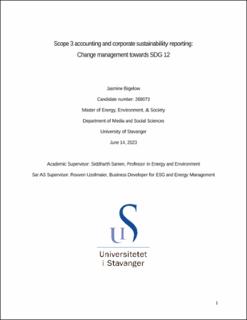| dc.description.abstract | As reaching the Paris Agreement’s 1.5°C limit by 2050 draws near, there has been speculation that this target will be missed. Within this, Scope 3 emissions reduction is key, yet complex, and poorly integrated into firms’ organizational practices at present. Key barriers include the digitization aspect of the twin digital and sustainable transformations, Scope 3 reporting guidance and resources for firms, and widespread commitment to successful Scope 3 reporting. But what would it take for firms to enact sustainable practices in line with Sustainable Development Goal (SDG) 12 – Responsible Consumption and Production – and specifically target 12.6 – Sustainability reporting practices in companies – which necessarily includes Scope 3 reporting? This thesis unpacks this question for a firm that deals with industrial waste management and complex supply chains. This is a meaningful case study choice as this type of firm would fall under the European Union’s Corporate Sustainability Responsibility Directive (CSRD), which requires Scope 3 reporting from 2025 onwards, reporting on the 2024 fiscal year for EU country firms. The case firm, based in a European Economic Area country, will likely have to address Scope 3 reporting mandates in the near future. Within this case, the focus on Scope 3 is approached through a combination of reviewing thematic literature, analyzing pertinent firm operations, and especially information infrastructures related to Scope 3. This study took the form of a semester-long internship within the firm, including everyday observation and expert interviews with three key actors. Combining these empirical and theoretical sources, the analysis offers insights on firm readiness for Scope 3 adoption and the role of mission-oriented innovation ecosystems. In particular, these results reveal the need for countries to fund digitization of Scope 3-relevant processes, for firms to collaborate and cooperate across the value chain and across competing firms, for country- and sector-specific guidance on Scope 3 reporting, for country-specific emission factors, and for firms to proactively take initiative on Scope 3 within their sustainable transformation ecosystem. A thematic analysis of implementing an approach to Scope 3 mapping indicates that firms have adequate time to adopt a Responsible Research and Innovation (RRI) approach to Scope 3 reporting and are likely to benefit from taking a learning approach to RRI. In sum, the thesis highlights the significant challenge of Scope 3 reporting, problematizes the role of specific actors in mobilizing such action, and contributes to understanding how to enact progress on SDG 12 in this challenging and urgent domain. | |
